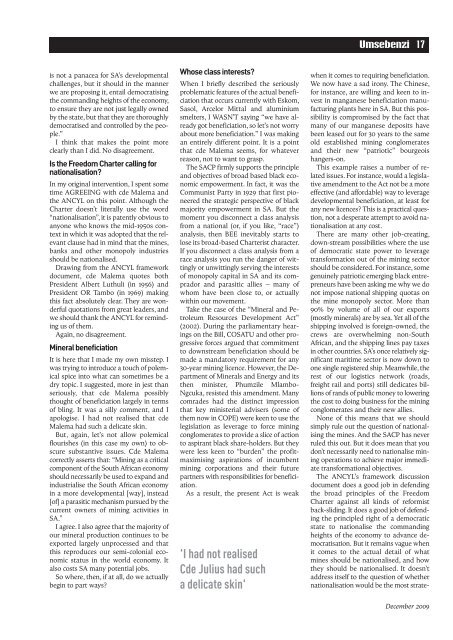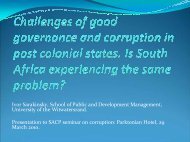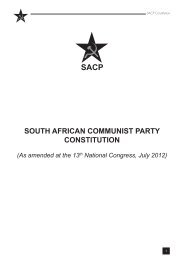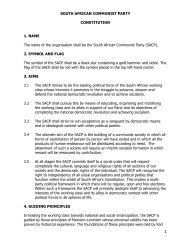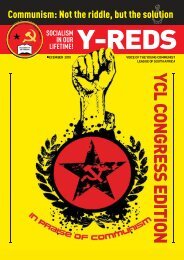Forward to Socialism!! - South African Communist Party
Forward to Socialism!! - South African Communist Party
Forward to Socialism!! - South African Communist Party
Create successful ePaper yourself
Turn your PDF publications into a flip-book with our unique Google optimized e-Paper software.
Umsebenzi 17<br />
is not a panacea for SA’s developmental<br />
challenges, but it should in the manner<br />
we are proposing it, entail democratising<br />
the commanding heights of the economy,<br />
<strong>to</strong> ensure they are not just legally owned<br />
by the state, but that they are thoroughly<br />
democratised and controlled by the people.”<br />
I think that makes the point more<br />
clearly than I did. No disagreement.<br />
Is the Freedom Charter calling for<br />
nationalisation?<br />
In my original intervention, I spent some<br />
time AGREEING with cde Malema and<br />
the ANCYL on this point. Although the<br />
Charter doesn’t literally use the word<br />
“nationalisation”, it is patently obvious <strong>to</strong><br />
anyone who knows the mid-1950s context<br />
in which it was adopted that the relevant<br />
clause had in mind that the mines,<br />
banks and other monopoly industries<br />
should be nationalised.<br />
Drawing from the ANCYL framework<br />
document, cde Malema quotes both<br />
President Albert Luthuli (in 1956) and<br />
President OR Tambo (in 1969) making<br />
this fact absolutely clear. They are wonderful<br />
quotations from great leaders, and<br />
we should thank the ANCYL for reminding<br />
us of them.<br />
Again, no disagreement.<br />
Mineral beneficiation<br />
It is here that I made my own misstep. I<br />
was trying <strong>to</strong> introduce a <strong>to</strong>uch of polemical<br />
spice in<strong>to</strong> what can sometimes be a<br />
dry <strong>to</strong>pic. I suggested, more in jest than<br />
seriously, that cde Malema possibly<br />
thought of beneficiation largely in terms<br />
of bling. It was a silly comment, and I<br />
apologise. I had not realised that cde<br />
Malema had such a delicate skin.<br />
But, again, let’s not allow polemical<br />
flourishes (in this case my own) <strong>to</strong> obscure<br />
substantive issues. Cde Malema<br />
correctly asserts that: “Mining as a critical<br />
component of the <strong>South</strong> <strong>African</strong> economy<br />
should necessarily be used <strong>to</strong> expand and<br />
industrialise the <strong>South</strong> <strong>African</strong> economy<br />
in a more developmental [way], instead<br />
[of] a parasitic mechanism pursued by the<br />
current owners of mining activities in<br />
SA.”<br />
I agree. I also agree that the majority of<br />
our mineral production continues <strong>to</strong> be<br />
exported largely unprocessed and that<br />
this reproduces our semi-colonial economic<br />
status in the world economy. It<br />
also costs SA many potential jobs.<br />
So where, then, if at all, do we actually<br />
begin <strong>to</strong> part ways?<br />
Whose class interests?<br />
When I briefly described the seriously<br />
problematic features of the actual beneficiation<br />
that occurs currently with Eskom,<br />
Sasol, Arcelor Mittal and aluminium<br />
smelters, I WASN’T saying “we have already<br />
got beneficiation, so let’s not worry<br />
about more beneficiation.” I was making<br />
an entirely different point. It is a point<br />
that cde Malema seems, for whatever<br />
reason, not <strong>to</strong> want <strong>to</strong> grasp.<br />
The SACP firmly supports the principle<br />
and objectives of broad based black economic<br />
empowerment. In fact, it was the<br />
<strong>Communist</strong> <strong>Party</strong> in 1929 that first pioneered<br />
the strategic perspective of black<br />
majority empowerment in SA. But the<br />
moment you disconnect a class analysis<br />
from a national (or, if you like, “race”)<br />
analysis, then BEE inevitably starts <strong>to</strong><br />
lose its broad-based Charterist character.<br />
If you disconnect a class analysis from a<br />
race analysis you run the danger of wittingly<br />
or unwittingly serving the interests<br />
of monopoly capital in SA and its comprador<br />
and parasitic allies – many of<br />
whom have been close <strong>to</strong>, or actually<br />
within our movement.<br />
Take the case of the “Mineral and Petroleum<br />
Resources Development Act”<br />
(2002). During the parliamentary hearings<br />
on the Bill, COSATU and other progressive<br />
forces argued that commitment<br />
<strong>to</strong> downstream beneficiation should be<br />
made a manda<strong>to</strong>ry requirement for any<br />
30-year mining licence. However, the Department<br />
of Minerals and Energy and its<br />
then minister, Phumzile Mlambo-<br />
Ngcuka, resisted this amendment. Many<br />
comrades had the distinct impression<br />
that key ministerial advisers (some of<br />
them now in COPE) were keen <strong>to</strong> use the<br />
legislation as leverage <strong>to</strong> force mining<br />
conglomerates <strong>to</strong> provide a slice of action<br />
<strong>to</strong> aspirant black share-holders. But they<br />
were less keen <strong>to</strong> “burden” the profitmaximising<br />
aspirations of incumbent<br />
mining corporations and their future<br />
partners with responsibilities for beneficiation.<br />
As a result, the present Act is weak<br />
'I had not realised<br />
Cde Julius had such<br />
a delicate skin'<br />
when it comes <strong>to</strong> requiring beneficiation.<br />
We now have a sad irony. The Chinese,<br />
for instance, are willing and keen <strong>to</strong> invest<br />
in manganese beneficiation manufacturing<br />
plants here in SA. But this possibility<br />
is compromised by the fact that<br />
many of our manganese deposits have<br />
been leased out for 30 years <strong>to</strong> the same<br />
old established mining conglomerates<br />
and their new “patriotic” bourgeois<br />
hangers-on.<br />
This example raises a number of related<br />
issues. For instance, would a legislative<br />
amendment <strong>to</strong> the Act not be a more<br />
effective (and affordable) way <strong>to</strong> leverage<br />
developmental beneficiation, at least for<br />
any new licences? This is a practical question,<br />
not a desperate attempt <strong>to</strong> avoid nationalisation<br />
at any cost.<br />
There are many other job-creating,<br />
down-stream possibilities where the use<br />
of democratic state power <strong>to</strong> leverage<br />
transformation out of the mining sec<strong>to</strong>r<br />
should be considered. For instance, some<br />
genuinely patriotic emerging black entrepreneurs<br />
have been asking me why we do<br />
not impose national shipping quotas on<br />
the mine monopoly sec<strong>to</strong>r. More than<br />
90% by volume of all of our exports<br />
(mostly minerals) are by sea. Yet all of the<br />
shipping involved is foreign-owned, the<br />
crews are overwhelming non-<strong>South</strong><br />
<strong>African</strong>, and the shipping lines pay taxes<br />
in other countries. SA’s once relatively significant<br />
maritime sec<strong>to</strong>r is now down <strong>to</strong><br />
one single registered ship. Meanwhile, the<br />
rest of our logistics network (roads,<br />
freight rail and ports) still dedicates billions<br />
of rands of public money <strong>to</strong> lowering<br />
the cost <strong>to</strong> doing business for the mining<br />
conglomerates and their new allies.<br />
None of this means that we should<br />
simply rule out the question of nationalising<br />
the mines. And the SACP has never<br />
ruled this out. But it does mean that you<br />
don’t necessarily need <strong>to</strong> nationalise mining<br />
operations <strong>to</strong> achieve major immediate<br />
transformational objectives.<br />
The ANCYL’s framework discussion<br />
document does a good job in defending<br />
the broad principles of the Freedom<br />
Charter against all kinds of reformist<br />
back-sliding. It does a good job of defending<br />
the principled right of a democratic<br />
state <strong>to</strong> nationalise the commanding<br />
heights of the economy <strong>to</strong> advance democratisation.<br />
But it remains vague when<br />
it comes <strong>to</strong> the actual detail of what<br />
mines should be nationalised, and how<br />
they should be nationalised. It doesn’t<br />
address itself <strong>to</strong> the question of whether<br />
nationalisation would be the most strate-<br />
December 2009


